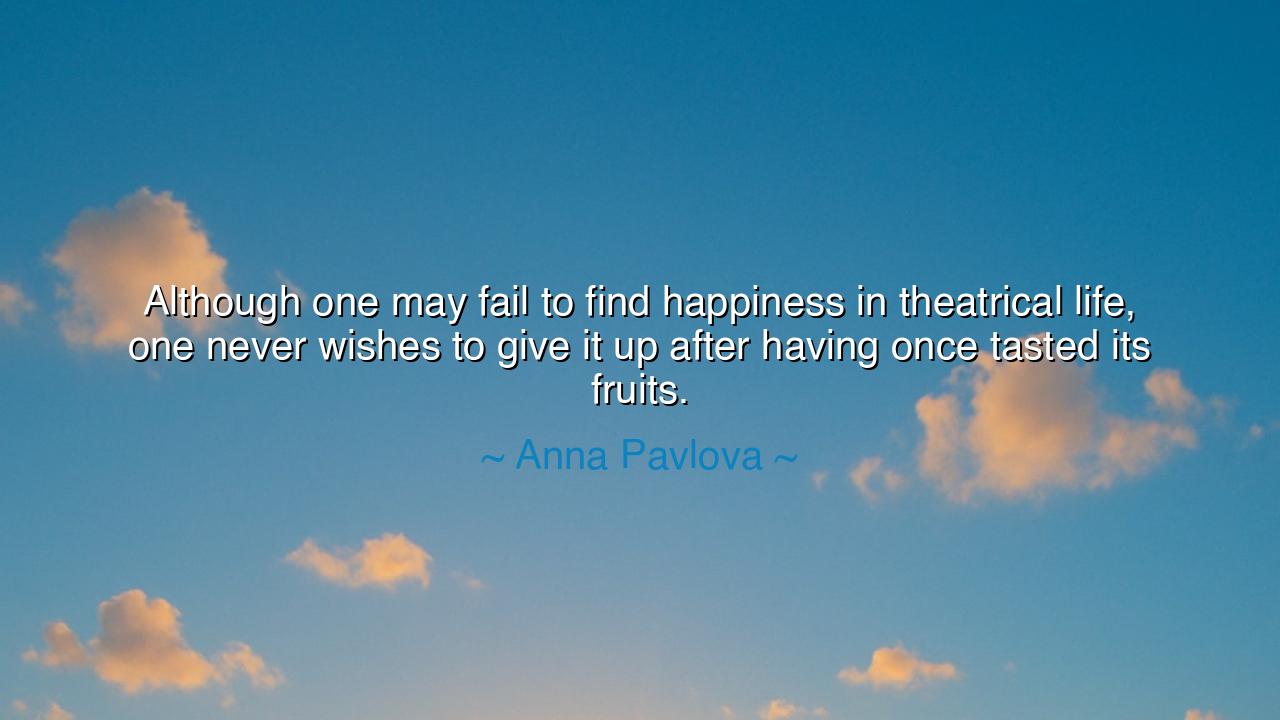
Although one may fail to find happiness in theatrical life, one
Although one may fail to find happiness in theatrical life, one never wishes to give it up after having once tasted its fruits.






“Although one may fail to find happiness in theatrical life, one never wishes to give it up after having once tasted its fruits.” — Anna Pavlova
In these poignant and immortal words, Anna Pavlova, the divine swan of ballet, reveals the bittersweet truth of the artist’s path — that the stage is both a sanctuary and a torment, a source of exaltation and exhaustion, joy and sacrifice. She speaks not merely of the theatre as a place of performance, but of the theatrical life as a way of being — one bound to passion, to the pursuit of beauty, to the endless yearning to express what words cannot hold. To those who have known the stage, Pavlova says, its fruits — the ecstasy of creation, the communion with an audience, the fleeting taste of immortality — are so intoxicating that even amid sorrow and struggle, one cannot renounce them.
The origin of this quote lies in Pavlova’s own life — a life that embodied the triumph and tragedy of art. Born in poverty in St. Petersburg, she rose to become the most celebrated ballerina of her age. Yet her glory was forged through pain: endless rehearsals, lonely tours, and the constant demand to embody perfection. The theatre gave her fame but took her peace. And yet, she never turned away from it. To dance, for Pavlova, was not a career — it was life itself, the pulse of her being. Her words echo with the sorrow of one who understood that art’s gift is inseparable from its price.
In her time, Pavlova transformed ballet from an aristocratic entertainment into a universal language of emotion. She traveled the world, performing for miners, peasants, and kings alike, bringing beauty to those who had never seen it. She was often lonely, her body worn from the road, her heart yearning for rest. But when she stepped onto the stage, something divine stirred within her — a light that lifted her above fatigue and fear. That moment of transcendence, fleeting as it was, became her sustenance. This is the fruit of the theatrical life she spoke of — not fame or applause, but the sacred intoxication of giving one’s soul to art and feeling it returned in kind by those who watch.
The ancients, too, knew this duality of the creative path. The poet Sophocles said that “to love beauty is to suffer,” and the sculptors of Greece, who carved divinity from stone, bled in the pursuit of perfection. They understood that every act of creation draws from the artist’s own life-force. To dedicate oneself to art is to live perpetually between joy and longing, fulfillment and loss. Pavlova’s insight joins this timeless wisdom — that the artist, even in despair, cannot escape their calling. Once they have tasted creation, they are forever bound to it, as the bee to the flower, as the lover to the beloved.
Consider, too, the story of Vincent van Gogh, who found little happiness in his artistic life — poverty, rejection, and madness were his constant companions. Yet even in his darkest hours, he painted the stars, the fields, and the faces of humble men and women with divine intensity. Though he knew despair, he could never turn from his art, for in those moments of creation he touched eternity. His life, like Pavlova’s, proves that the pursuit of beauty often brings sorrow, but that the soul once awakened by art cannot return to sleep.
Through her words, Pavlova teaches that happiness and fulfillment are not the same. Happiness is fleeting, fragile, and easily disturbed by the hardships of life. But fulfillment — the profound satisfaction of doing what one was born to do — transcends comfort. Those who dedicate themselves to their art may suffer, yet they live with purpose. To renounce that calling would be to renounce one’s essence. The fruits of the theatrical life are thus bittersweet: they are not peace, but passion; not rest, but revelation.
So let this be a lesson for all who dream, create, or strive: do not measure your life by comfort, but by meaning. Whether you are an artist, a worker, a teacher, or a parent, if your path demands sacrifice but fills your heart with light, do not abandon it when happiness wavers. For the deepest joys are often hidden within struggle, and the most sacred fulfillment lies on the far side of pain. As Anna Pavlova reminds us, once you have known the divine fire of purpose — once you have tasted the fruits of creation — you will never again wish to live without them.






AAdministratorAdministrator
Welcome, honored guests. Please leave a comment, we will respond soon